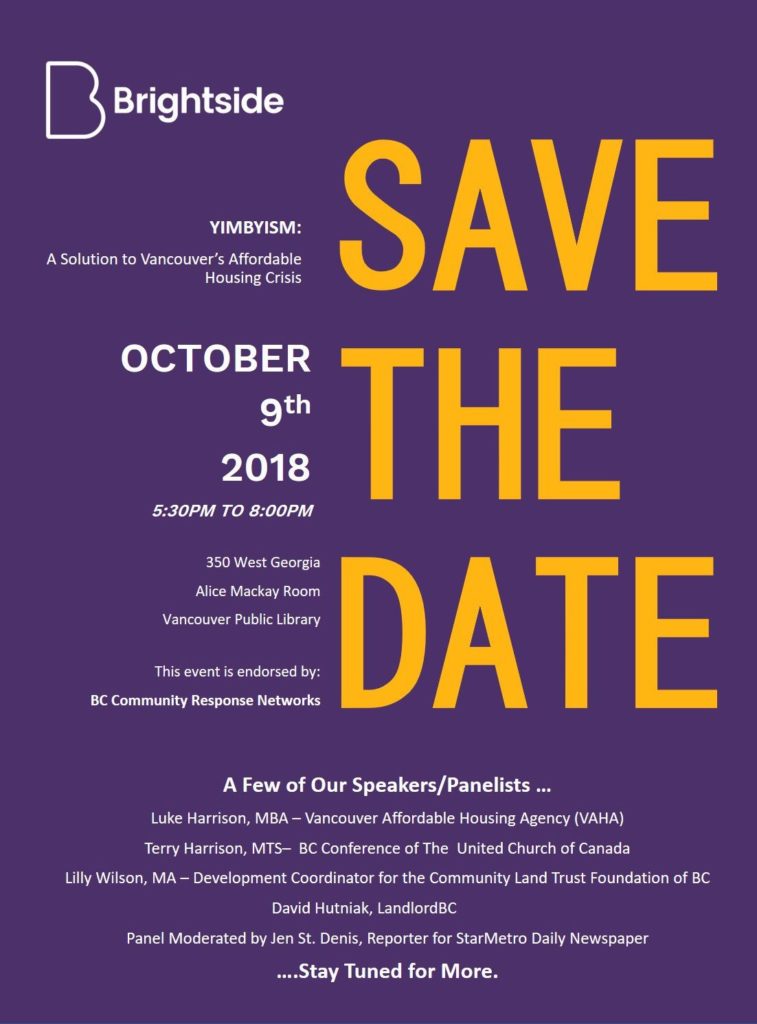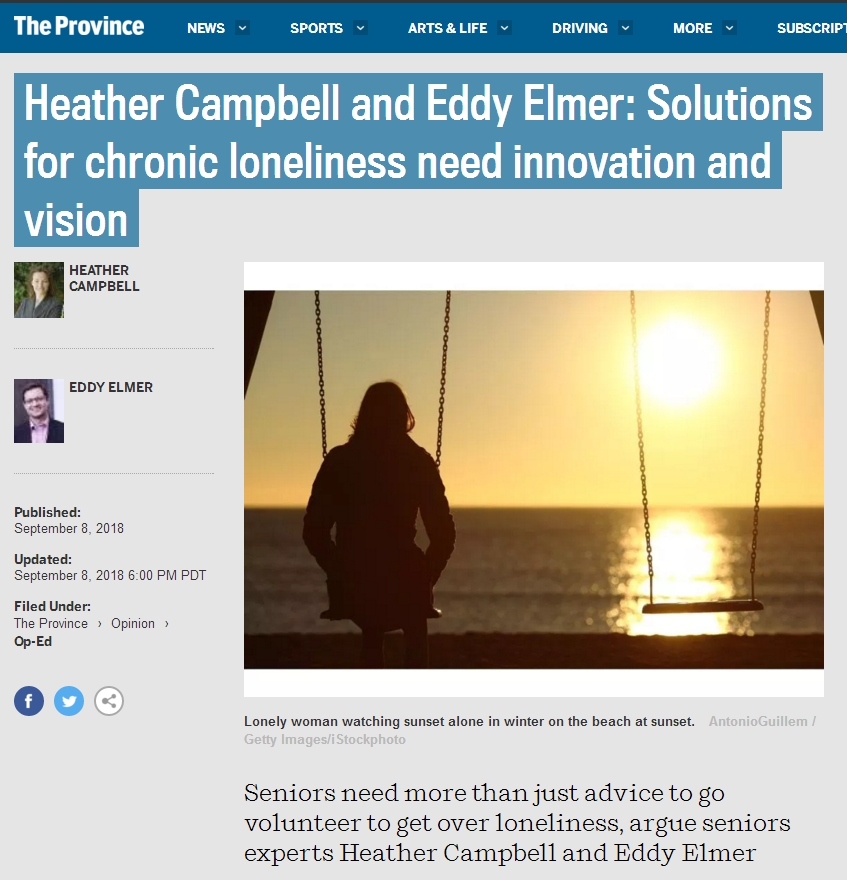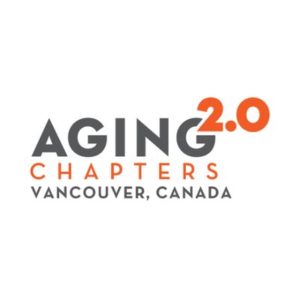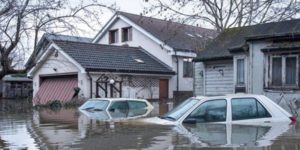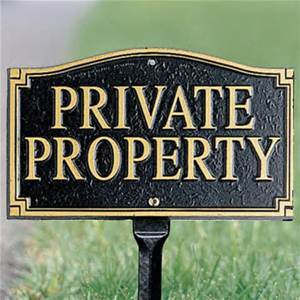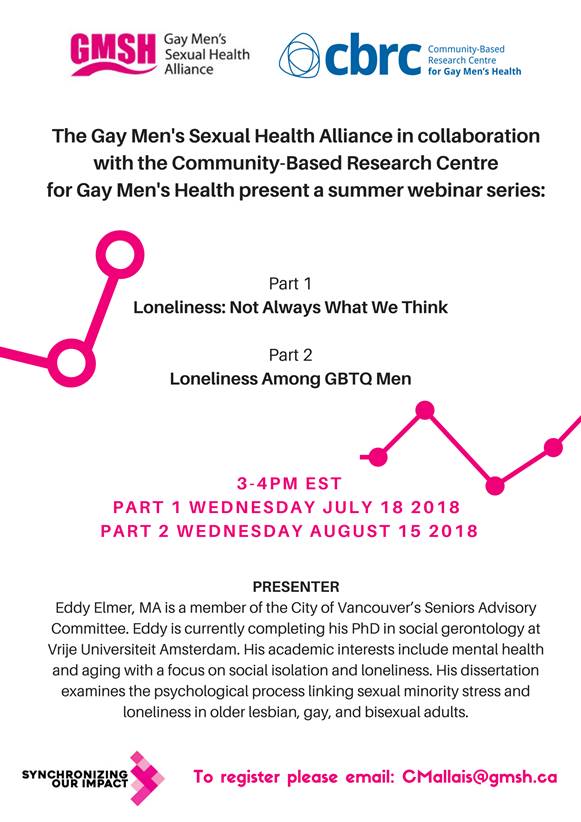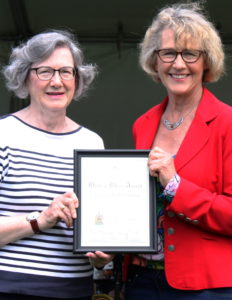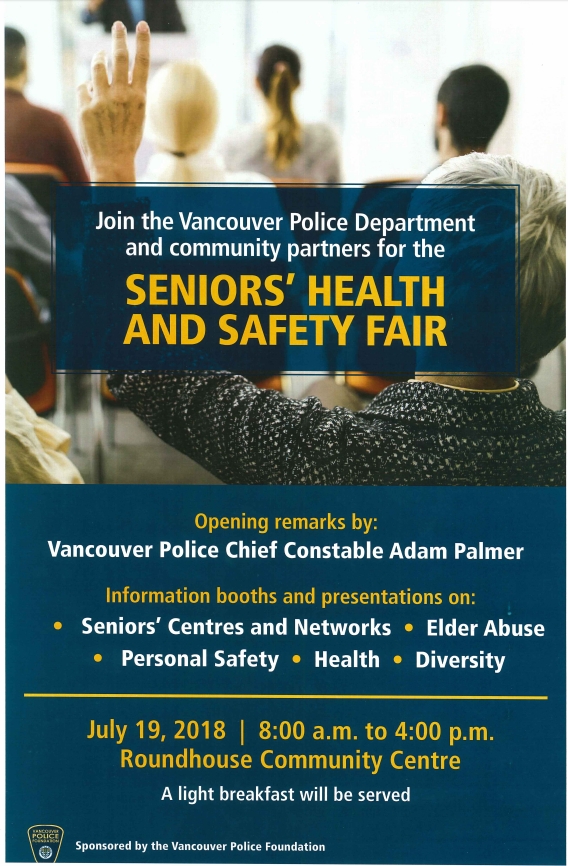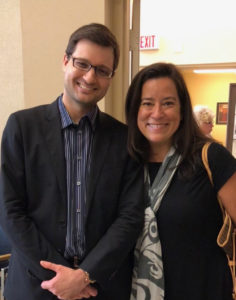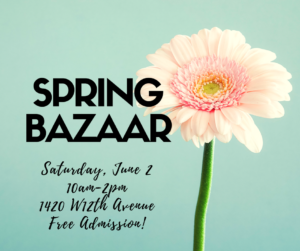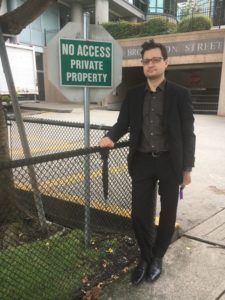
Eddy Elmer is a Vancouver resident who is concerned about city-mandated privately owned public spaces (POPS) after he was asked to leave Harbourside Park because he doesn’t live in the adjacent towers.
As the city increasingly relies on developers to provide public amenities in exchange for density, ground rules are needed, critics argue
By Kerry Gold
Special to The Globe and Mail
Published July 19, 2018
Late one night on the Canada Day long weekend, Eddy Elmer was sitting at his usual spot at the Harbourside Park Towers fountain in downtown Vancouver. It is a large public plaza between the two Arthur Erickson-designed towers that was created as part of a rezoning in the 1990s.
Mr. Elmer, a West End resident, has frequented the garden many times since he moved to Vancouver in 2000. However, on that night, a security guard approached him and asked if he lived in the adjacent towers. When he responded that he didn’t, the security guard told him he didn’t belong there and he needed to move along. He directed Mr. Elmer to the proper exit and watched until he left.
“I sat there, dumbfounded, thinking, ‘Is this a joke?’ I had barely even had a chance to sit down,” he said. “I was there half a minute. I didn’t argue … I continued with my walk, but I felt like a criminal. I certainly won’t be going back there.”
Mr. Elmer is a night owl. During the day, he works on his PhD thesis and it is his custom to take nightly walks. Because he has a back problem, he likes to take a break and sit in the park. He knew Harbourside was a public space. However, there are signs around the property that say it’s private property. As well, the plaza is a natural shortcut from West Pender to West Hastings Streets, but the addition of a chain-link fence along the Hastings side makes it impossible to cut through.
“Residents are being displaced from their homes and now we are being displaced from our public spaces. Where are we supposed to go?”
Privately owned public spaces, called POPS, are becoming increasingly important as the city adapts to a growing demographic and continues to rely on developer negotiations to provide these spaces. When a property is rezoned, such as Harbourside, the city negotiates for public space in exchange for something else, such as added density. The trade-off for the taxpayer is the advantage of green space. But based on Mr. Elmer’s experience, the question becomes, are these POPS truly available to all members of the public? Or are they rule-bound spaces that make people feel as if they’re not welcome?
“Think of what this means,” Mr. Elmer said. “For all these years, in all these developments, the public has thought it’s getting something from developers in exchange for these public amenities. And the public amenities may not have been public to begin with. It’s like a bait and switch, almost: ‘Here’s a public space, and you can kind of use it as I see fit.’ That’s not a public space.
“It’s not right when developers provide a public amenity in exchange for density and then property managers take those amenities away or at least strongly discourage people from using them.”
It was ironic that Mr. Elmer was ejected from the plaza because for several years, he has been part of the city’s seniors advisory committee, which advises Vancouver City Council on ways to improve the health and well-being of seniors (he is not speaking on behalf of the committee, but rather as an individual for this story).
Mr. Elmer is a PhD candidate in social gerontology who studies social isolation and loneliness. He knows the importance of community spaces within the city, not just for seniors, but for everybody. He also studies isolation within the older LGBT (lesbian, gay, bisexual, transgender) community.
The city and Vancouver Coastal Health Authority commissioned Mr. Elmer to complete a report and submit recommendations on the topic. He submitted his report in May and among those recommendations was the need for miniparks that are inviting and encourage social interaction.
We should all care about our social networks, Mr. Elmer said. According to his report, in the next 25 years, local residents between 65 and 74 years old will increase by 79 per cent. People older than 75 will increase by 105 per cent.
The property manager for Harbourside Park Towers, Kal Arabi, said the security guard who told Mr. Elmer to move along was new and acted in error. He said it was a mistake, and the “private property” signs are only there to deter skateboarders and people who want to sleep there. He said he plans to ask the strata council for permission to remove the signs so people will understand it’s open to the public.
“It’s just for skateboarders and homeless people sleeping overnight – that’s the only reason we put those signs there,” Mr. Arabi said. “The gates are not locked. They are open. We have a lot of people walking their dogs and we have no problem. Construction people can sit there as well. We have no issue.
“I told the security guard, and I told the staff, ‘It’s a public park, even if it says private. You can ask homeless people to leave, nicely. But you don’t have the right to tell anybody you can’t be on the property.’ ”
POPS do not fall under the park board jurisdiction. It falls to the property managers to maintain the spaces and the rules around how the spaces can be used have long been a grey zone, said artist and student George Rahi, who co-wrote a paper called Accessing Vancouver’s Privately Owned Public Spaces.
As an act of reclaiming these spaces, Mr. Rahi also conducted a “sound walk” through POPS downtown with a large group of people who wanted to experience the city by listening. They discovered many spaces that are public, unbeknownst to most people. But use of these spaces is not without scrutiny, which has the effect of feeling as if they are gated communities. The tour got a lot of looks from security guards, he said, but they had the power of being part of a group.
“I think you are hearing complaints from specific users that have an allegiance to their neighbourhood, and a sense of community, and they feel that they shouldn’t be unjustly shut off from these spaces and they should be more accessible,” he said.
“Certainly, in a lot of areas in Vancouver, now we have this dual city of the very well-heeled upper class in luxury condos and the Downtown Eastside, which is a working-class neighbourhood and place with tremendous poverty. So, the juxtaposition between wealth in these scenarios is definitely a thing.”
Mr. Rahi said that he even felt under surveillance when researching these spaces for his geography paper.
“In our research process, if we were there taking notes and taking a photo or two, it didn’t take long for a security guard to look at us and notice we were doing things that didn’t fit their model of what their ideal behaviour of the space is, so we would get asked questions or told we weren’t allowed to take photos.
“They are usually pushing the boundaries of legality around trying to discourage people.”
As Mr. Elmer points out, he hardly looked like someone who could cause problems for the property.
“I’m a young nerd. I had a little notebook. You can imagine somebody who didn’t look right, how they would be treated.”
The city responded that it doesn’t have data on the number of POPS in the downtown or West End that are not accessible to the public.
“We are beginning to explore the role of the POPS associated with residential buildings and how these are secured and operated – such as Harbourside Towers,” a city staffer said in an e-mail.
The city also acknowledged that as the city grows, it would increasingly depend on the use of POPS, which will make their accessibility even more important.
On July 10, in response to Mr. Elmer’s complaint, Councillor Adriane Carr brought the problem to Vancouver City Council and asked that staff prepare a report on the problem of the public being prohibited from using public space.
“It is unfortunately much more common that the public is relying on private developers who, in Vancouver’s case, are using the CAC [community amenity contributions] program and those negotiations are kept from public view in most cases, so it’s hard to know if the public is getting the best deal it can out of these sorts of redevelopments,” Mr. Rahi said.
“I think we’re all coming around to this question of what does it mean to be a public space in a city that has so thoroughly developed these private developments to have these features that are publicly accessible, but it’s not clear for the average person, ‘Is it okay to be here?’ ”
Mr. Rahi said another problem is the policing of public spaces and the removal of shelter and seating to dissuade undesirable behaviour. On a little tour around his West End neighbourhood, Mr. Elmer showed a public space that had several benches removed. A water fountain had been shut off.
“It becomes a kind of widespread assault on the public realm, in terms of taking away seating options, taking away shelter, having cameras and security guards patrolling these spaces,” Mr. Rahi said. “Even the presence of those things alone has a tremendous psychological power on influencing public space.”
The solution to the problem lies with holding the developers accountable and doing follow-up, Mr. Rahi said. He cited the case of Concord Pacific’s four-hectare False Creek North site. In 1990, the area between BC Place and Science World was designated a park as part of the official development plan. To the dismay of the community, that park never materialized. Now, an interim park on the eastern portion is in the works.
“That is another example of the developers not being held accountable for their ability to amass private capital at the expense of these unkept promises for public services,” Mr. Rahi said.
“I think part of the issue is that we don’t have that much of a citywide consciousness around all of these spaces, which is more the purview of the city, to develop good policy to make sure the space when first built is as accessible as possible, and has clear signage that invites the public in, and it signals their right to use the space, which is a fundamental part of the beginning point for reclaiming a lot of these spaces,” he said.
Park board commissioner Sarah Kirby-Yung said it’s a matter of negotiating better agreements from the outset. She prefers a unique new model just recently announced, in which the park board approved a plan for nine acres of park space at Oakridge Centre that involves the developer transferring ownership of the land to the city.
“In return for the rights given to the developer, as part of increasing density and zoning benefits on site, the ownership is being transferred to the city and the park board,” Ms. Kirby-Yung said. “That’s a great model, because that will ensure that it remains open to the public.
“I think that’s the biggest challenge and responsibility, moving forward, for those who are advocating on the public’s behalf, is to make sure there are clear agreements,” she added. “It’s got to be very clear about the use, and the time of day for use, and it can’t be gated. Does it look welcoming? Is there signage? Does it say it is a public park? All those things need to be considered or else you have situations like the one with Mr. Elmer.”











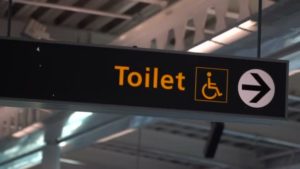 We are pleased to announced that the TransLink board of directors has finally approved a policy on public washrooms, with an implementation plan to be announced next year.
We are pleased to announced that the TransLink board of directors has finally approved a policy on public washrooms, with an implementation plan to be announced next year.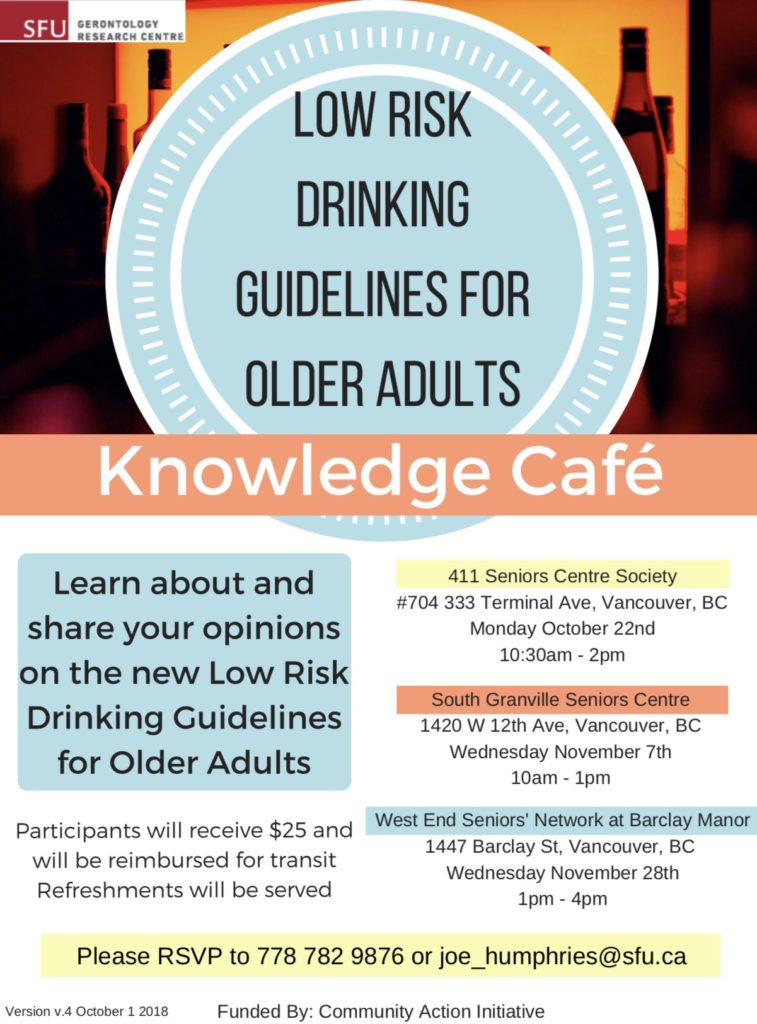
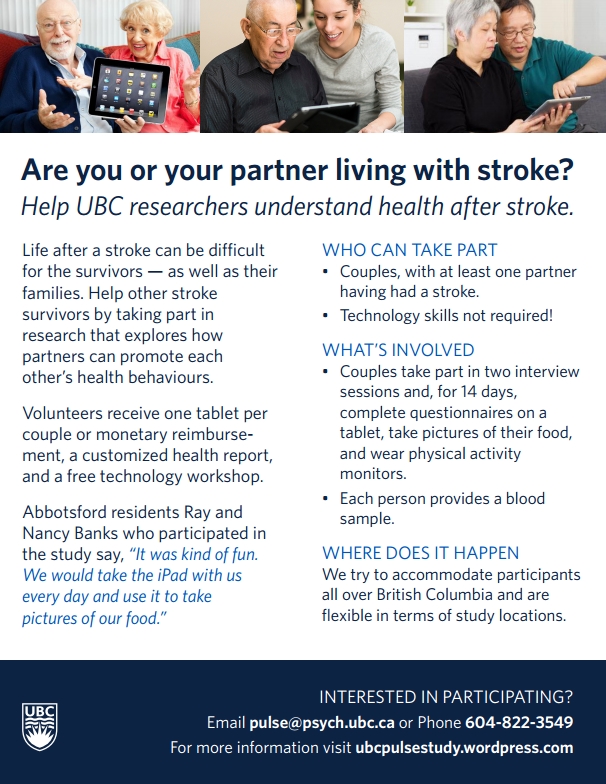
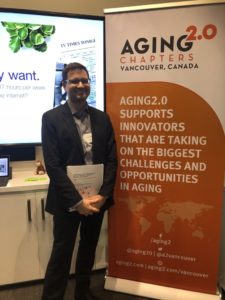 The Committee was pleased to be invited to the inaugural launch of the Vancouver Chapter of
The Committee was pleased to be invited to the inaugural launch of the Vancouver Chapter of  The City is providing assistance to ensure that all eligible voters can cast their ballot. This includes expanding voting to shelters, drop-in centres, and small care facilities; providing assistance with marking ballots; and facilitating voting outside of the voting centre (e.g., from your car).
The City is providing assistance to ensure that all eligible voters can cast their ballot. This includes expanding voting to shelters, drop-in centres, and small care facilities; providing assistance with marking ballots; and facilitating voting outside of the voting centre (e.g., from your car).